
Certain home remedies may help improve a person’s acne pimples and sores. Home remedies to help get rid of acne include herbal creams and gels, essential oils, natural supplements, and lifestyle changes.
Acne develops when pores become clogged or infected with bacteria. Acne is a common skin condition in the United States, affecting an estimated 50 million people living in the country.
People can use specific home remedies to help balance the skin’s oil levels, reduce inflammation, kill bacteria, and prevent future acne breakouts.
However, there is not much scientific evidence to prove the effectiveness of most home remedies. This article discusses the current evidence for some home remedies that people may find helpful.
Home remedies are not tested for safety and effectiveness by the Food and Drug Administration (FDA), so remain cautious before using these in place of professional medical care. It is always best to let a doctor know the symptoms experienced and discuss available treatment options.
Share on PinterestIuliia Bondar/Getty Images
Acne is a hypersensitivity of the sebaceous glands of the skin. Hormones, bacteria, and inflammation can lead to acne lesions appearing on the skin.
Causes of acne can also include:
- certain medications: lithium, steroids, anticonvulsants
- restrictive clothing: shoulder pads, backpacks, underwire bras, headbands
- endocrine disorders: polycystic ovarian syndrome (PCOS)
- genetics: inherited from family members
- smoking: especially in older individuals
Home remedies for acne
Some of the most popular home remedies for acne involve natural herbal extracts, many of which traditional medicine practitioners may use.
Below, we discuss the best home remedies for acne, what the research says, and lifestyle changes that can help.
If an individual is interested in trying certain topical remedies, it is a good idea to talk with a dermatologist before applying the topical remedy directly to the skin, or do a patch test first, which consists of putting a small amount of the topical treatment on the wrist or hand to test for skin reactions.

1. Tea tree oil
Tea tree oil is a natural antibacterial and anti-inflammatory, which means that it might kill P. acnes, the bacteria that causes acne.
Tea tree oil’s anti-inflammatory properties mean that it can also help reduce the swelling and redness of pimples.
A 2019 review study looked at the existing evidence for tea tree oil and acne. The researchers found that tea tree oil products can reduce the number of acne sores in people because of tea trees’ antimicrobial capabilities.
This same review also noted research showing the total number of acne lesions of study participants was reduced from 23.7 to 10.7 after 8 weeks of using tea tree oil facial products.
How to use tea tree oil
People can apply tea tree extract to their acne in creams, gels, or essential oils. However, a 2016 review article points out that tea tree oil can cause allergic reactions in some individuals, and suggests people use tea tree oil products under 5%Trusted Source concentration to avoid skin irritation.
Although research suggests essential oils may have some health benefits, it is important to remember that the Food and Drug Administration (FDA) does not monitor or regulate the purity or quality of these oils. A person should talk with a healthcare professional before using essential oils and research the quality of a particular brand’s products. It is also important to always do a patch test before trying a new essential oil.
2. Jojoba oil
Jojoba oil is a natural, waxy substance extracted from the seeds of the jojoba shrub.
The waxy substances in jojoba oil may help repair damaged skin, which may also help speed up wound healing, including acne lesions.
Some of the compounds in jojoba oil might help reduce skin inflammation, which may reduce redness and swell around pimples, whiteheads, and other inflamed lesions.
In a 2012 study, researchers gave 133 people clay face masks that contained jojoba oil. After 6 weeks of using the masks two to three times per week, people reported a 54% improvement in acne.
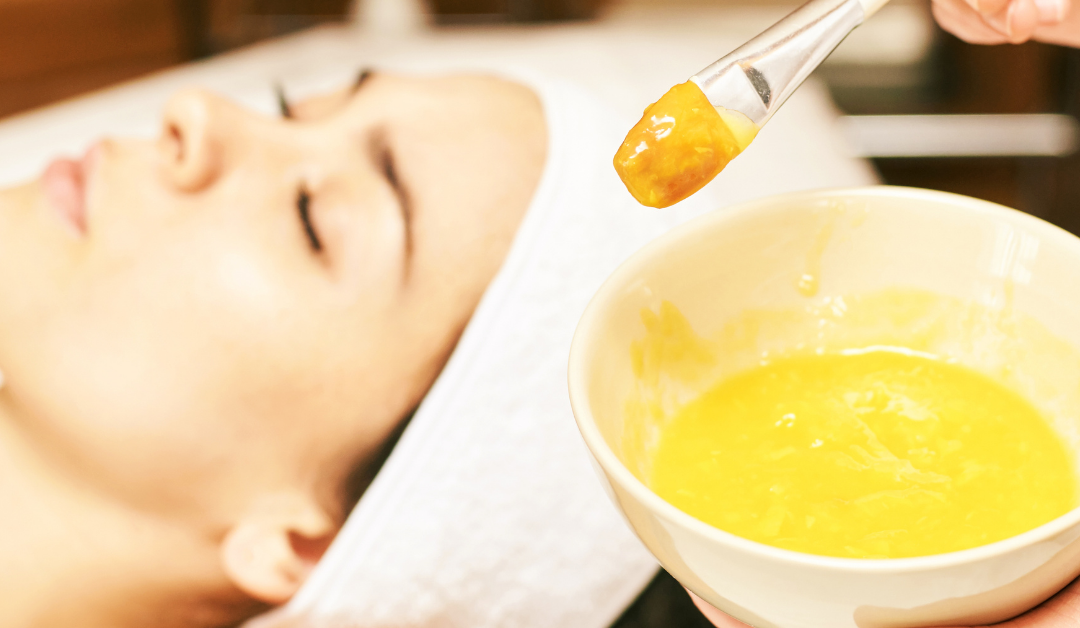
How to use jojoba oil
Try mixing jojoba essential oil with a gel, cream, or clay face mask and apply it to acne. Otherwise, place a few drops of jojoba oil on a cotton pad and rub this gently over acne sores.
3. Aloe vera
Aloe vera is a natural antibacterial and anti-inflammatory, meaning it may reduce the appearance of acne and prevent acne breakouts.
Aloe vera contains sugar molecules, amino acids, and zinc, making it an excellent skin moisturizer and protectant. It is especially suitable for people who get dry skin from other anti-acne products.
In a 2021 studyTrusted Source, researchers determined that the number of bumps, lesions, and dry skin lowered when using aloe vera combined with ultrasound and soft mask applications.
How to use aloe vera gel
An individual should clean acne sores and then apply a thin layer of cream or gel twice daily after cleansing with soap.
4. Honey
For thousands of years, honey has treated skin conditions because it contains many antioxidants that can help to clear clogged pores.
However, while there is evidence that honey has specific antimicrobial effects, a 2016 reviewTrusted Source did not find strong evidence for honey’s effect on acne specifically.
How to use honey
Using a clean finger or cotton pad, rub a little honey into pimples. Otherwise, add honey to a face or body mask.
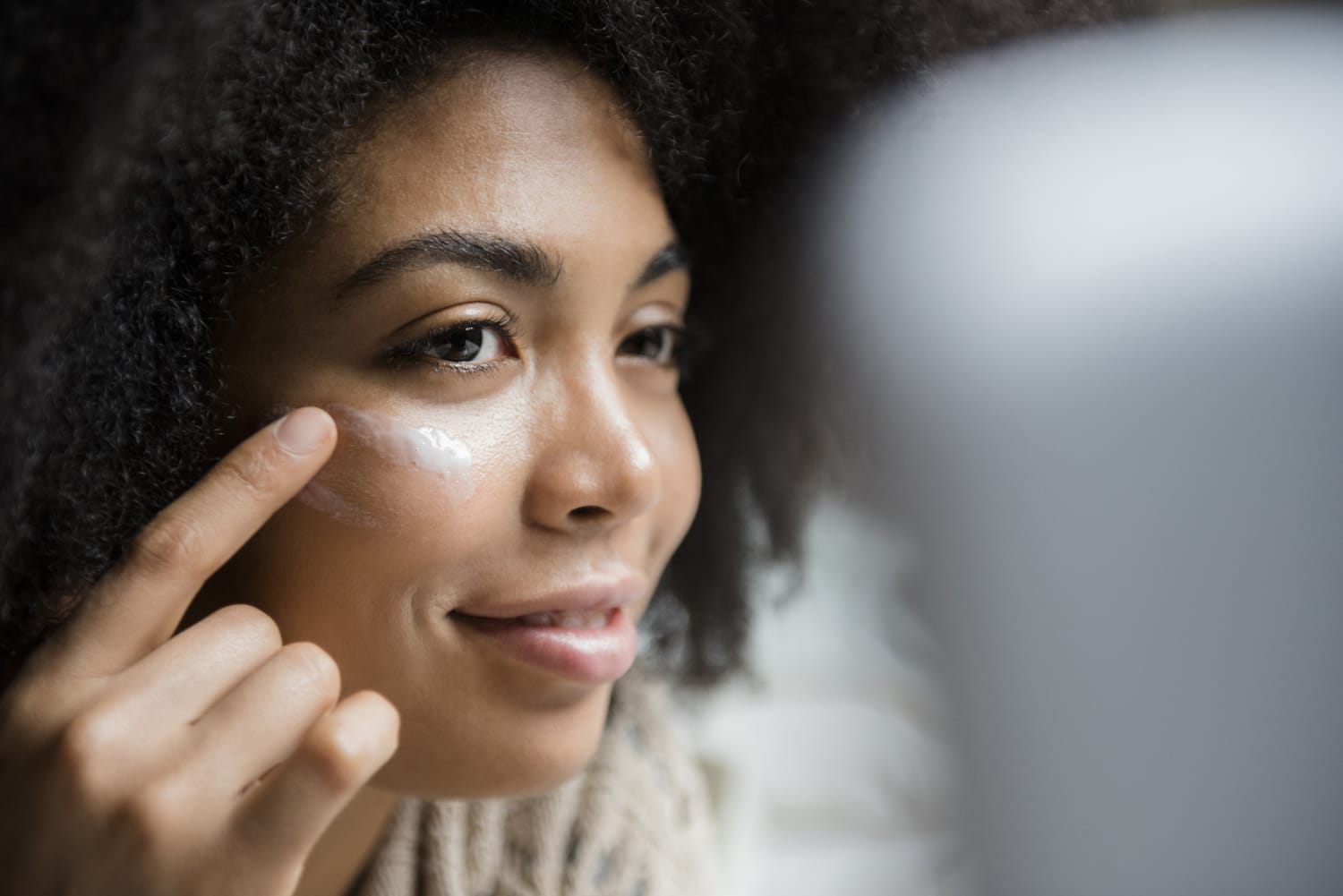
5. Zinc
With its anti-inflammatory properties, zinc is often touted as a method to reduce acne lesions and redness.
According to a 2021 articleTrusted Source, research is conflicting on zinc’s effectiveness. However, a person can expect better results when applying the supplement directly to the skin. The reason is that when taken orally, some of the supplement gets broken down in the digestion process and may lose efficacy along the way.
How to use zinc
People can apply zinc topically onto the skin or take it via supplement form.
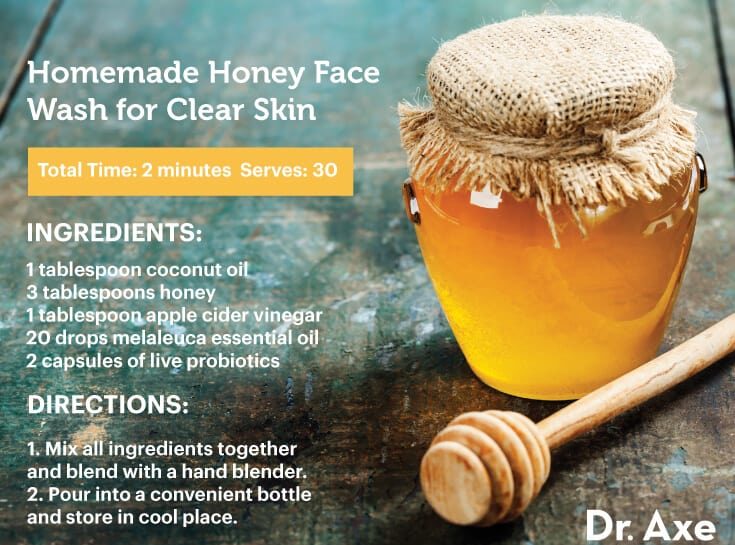
6. Green tea
Green tea contains high concentrations of a group of polyphenol antioxidants called catechins.
Some people with acne have too much sebum, or natural body oils, in their pores and not enough antioxidants. Antioxidants help the body break down chemicals and waste products that can damage healthy cells.
Green tea also contains compounds that may help to:
- reduce the skin’s sebum production
- reduce P. acnes
- reduce inflammation
How to use green tea
An individual can either drink green tea or put green tea extract on their skin, though researchers say current evidence is limited.
However, one 2017 studyTrusted Source found a 79–89%Trusted Source reduction in whiteheads and blackheads after using a polyphenol green tea extract for 8 weeks.
People can find green tea in most food stores. Green tea extract is more challenging to find but available from some health stores or online.
7. Echinacea
Echinacea, also known as purple coneflower, may contain compounds that help destroy viruses and bacteria, including P. acnes.
Many people believe that echinacea can boost the immune system and reduce inflammation to fight off or prevent infections, including colds and flu. While there is some evidence that echinacea can help stop the spread of P. acnes and reverse inflammation caused by bacteria, current research is minimal.
How to use echinacea
People can apply echinacea creams to areas with acne lesions or take echinacea supplements. Echinacea products are available from health stores or online as creams or supplements.
8. Rosemary
Rosemary extract, or Rosmarinus officinalis, contains chemicals and compounds with antioxidant, antibacterial, and anti-inflammatory properties.
Further research is needed to measure its effectiveness.However, a 2016 research article suggested that rosemary extract can reduce inflammation from the acne-causing bacteria P. acnes.
9. Purified bee venom
Although it’s not wildly available, purified bee venom contains antibacterial properties.
In a 2016 studyTrusted Source, people who applied a gel containing purified bee venom to their face for 6 weeks saw a reduction of mild to moderate acne lesions.
Though more research is needed, purified bee venom may be a beneficial future ingredient in acne medication.
10. Coconut oil
Like some other natural remedies listed, coconut oil contains anti-inflammatory and antibacterial compounds.
These properties mean that coconut oil may help eradicate acne-causing bacteria and reduce the redness and swelling of pimples. Due to its soothing and moisturizing effectsTrusted Source, coconut oil may help speed up the healing of open acne sores. However, focused research on coconut oil as an acne deterrent is lacking.
How to use coconut oil
Try rubbing pure, virgin coconut oil directly into the area with acne. Look for coconut oil in the natural foods section of grocery stores or online.
Lifestyle changes for acne
Along with home remedies, specific lifestyle changes can have a powerful effect on keeping the body healthy, making the skin less oily, and reducing acne flare-ups.
11. Avoid touching pimples
It can be very tempting, but touching acne sores will irritate the skin, may make the pimple worse, and can spread pimples to other areas.
Touching, rubbing, squeezing, or popping acne sores can also introduce more bacteria into the lesion, causing further infection. Squishing a pimple can push bacteria and debris further into the skin, so the spot may come back worse than it was before.
Talk with a doctor about large sores or those deep under the skin to find out how to treat them safely.
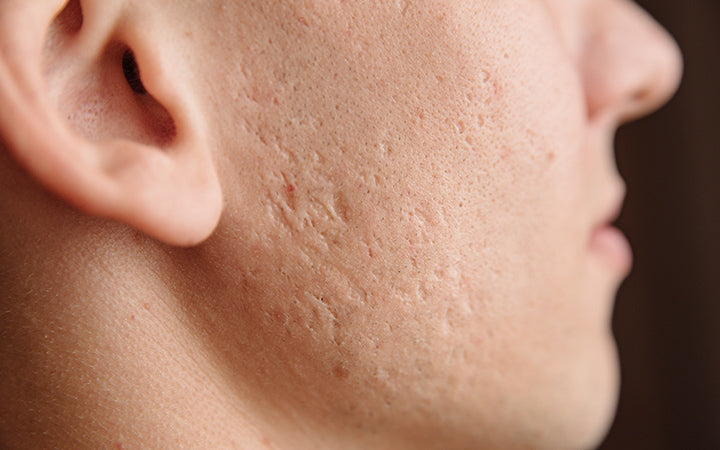
12. Choosing the right cleanser
Many regular soaps have an acidity, or pH, that is too high and can irritate the skin, making acne worse.
Choose mild cleansers, rinses, and washes to reduce the risk of acne flare-ups and let sores heal.
13. Using oil-free skin care
Oil-based or greasy products can block pores, increasing the risk of clogged and growing acne sores.
Look for skin care products and cosmetics labeled as “oil-free” or “noncomedogenic,” which contain ingredients that allow pores to breathe.
14. Staying hydrated
When the skin is dry, it can become irritated or damaged, which can make acne worse. Staying hydrated also ensures new skin cells develop correctly as sores heal.
There is no standard daily recommended water intake because each person’s water needs vary depending on age, how active they are, temperature, and any medical conditions.
Making a concentrated effort to drink more water during the day is a good starting point.
15. Reducing stress
The American Academy of Dermatology lists stress as a possible cause of acne flare-ups.
Stress causes levels of the hormone androgen to increase. Androgen stimulates hair follicles and oil glands in pores, increasing the risk of acne.
Tips for managing stress include:
- talking with family, friends, a doctor, or other supportive people
- getting enough sleep
- eating a healthful, balanced diet
- exercising regularly
- limiting alcohol and caffeine consumption
- practicing deep breathing, yoga, mindfulness, or meditation
There are many medical treatment options for acne, and many highly effective, though they can cause side effects and may not be suitable for everyone.
People can speak with a doctor about whether using medication or medicinal creams is right for them, primarily if home remedies have not worked.
Popular over-the-counter treatments for mild to moderate acne sores contain the following active ingredients:
- salicylic acid
- benzoyl peroxide
- alpha hydroxy acids
Doctors may prescribe more vital medication to treat acne, including:
- tretinoin gels and creams
- clindamycin gels and creams
- oral antibiotics
- oral isotretinoin
- birth control medications
People may want to talk with their doctor if their acne sores are:
- very painful
- often infected
- deep under the skin
- not responding to home treatment
- covering a large area of skin
- causing emotional distress
There are times when a person should see a doctor if they have acne because of the underlying causes. For example, home remedies may not be effective when acne occurs due to a hormone imbalance or an allergic response, leading to more severe conditions.
Hormonal acne
Hormonal acne occurs from a hormone imbalance and can occur from:
- Foods containing hormones. For example, dairy products can consist of hormones.
- Premenstrual flare-ups. Hormones fluctuate before a menstrual cycle and may lead to acne flares.
- Stress hormones. Feelings of intense anger and anxiety may aggravate acne due to stress hormones rising with the emotions.
- Polycystic ovarian syndrome (PCOS). PCOS is a common endocrine system disorder that can affect individuals during their reproductive years.
A doctor may offer potential treatment options or ways to avoid acne flare-ups with each type of hormonal acne.
Allergic acne
Acne is rarely itchy, so if a person experiences itchiness, it could signify another condition resembling acne.
For example, allergic dermatitis and hives mimic the symptoms of acne caused by an allergy such as medications, foods, or certain skin care products. As a result, allergic reactions can lead to severe symptoms, and medical attention is needed.
Gluten sensitivity can lead to dermatitis herpetiformis, which may appear as acne since a pruritic rash and blisters are symptoms. When one experiences gluten sensitivity, diet changes and medications may be necessary to control symptoms.
Outlook
People can choose from a wide range of home remedies to treat their acne. Not all treatments will work for everyone or in every case, however.
The Food and Drug Administration (FDA) does not monitor herbal products or essential oils.
Additionally, many natural remedies for acne are not scientifically proven to work, but some people may find them helpful.
Always talk with a doctor before using natural remedies for severe, chronic, deep, or painful acne sores. Likewise, speak with a doctor about minor acne sores that do not respond to primary care or continue to get worse.
What causes forehead acne?
People can develop forehead acne and pimples when tiny glands below the surface of the skin become blocked. Hormonal changes, stress, medication use, and other factors can cause it.
Acne does not pose any serious health risks, but people may think that it appears unattractive, and it can cause discomfort.
In this article, we look at what causes acne and pimples to develop on the forehead, and how they can be treated and prevented.
Causes

Acne is a chronic skin condition that can lead to the following lesions:
- whiteheads
- blackheads
- pimples
- cysts
- nodules
Acne can develop anywhere on a person’s body, but is particularly frequent on the face, shoulders, back, chest, and arms. A person may notice the appearance of acne when tiny glands just below the surface of the skin become blocked.
These glands, known as sebaceous glands, produce an oily substance called sebum. They can become blocked by too much sebum, dead skin cells, or bacteria. When this happens, the glands may become inflamed, and a pimple can develop.
Certain factors can increase the amount of sebum that is produced by the sebaceous glands. This sebum increases the likelihood of acne and pimples developing. Factors include:
- Hormonal changes. Acne is particularly common in puberty because hormone levels fluctuate significantly during this period.
- Stress. There is a link between stress and outbreaks of acne, but the reasons for this are unclear.
- Medication. Some types of medication can cause acne as a side effect. Examples include certain steroids, anticonvulsants, barbiturates, or lithium.
- Hygiene. Not washing the hair and face regularly can lead to oily deposits on the forehead and blockages that prompt acne.
- Hair products. Some hair products, such as gels, oils, or waxes, are linked to breakouts of acne that is known as pomade acne.
- Skin irritation. Using makeup on the forehead or wearing clothing such as hats, can irritate the forehead and also lead to acne. Frequently touching the forehead can also aggravate the skin and trigger acne.
Treatment will vary depending on the severity of the acne outbreak. Most people can treat their acne with over-the-counter (OTC) medications.
A wide variety of gels, soaps, lotions, and creams are available to treat acne. These products usually contain one or more of the following active ingredients:
- benzoyl peroxide
- salicylic acid
- retinol
- resorcinol
People can purchase many of these acne treatments online.
How well these treatments work can vary between individuals, so trial and error may be necessary to determine what is best. People with sensitive skin may benefit from sticking to creams or lotions.
A person’s symptoms may take several weeks to clear up entirely, so it is often necessary to be patient with these treatments. It is also common for some people to have mild side effects, such as skin irritation, in the early stages of treatment.
For people with more severe acne, prescription medication may be necessary. A skin specialist will be able to assess a person’s symptoms and determine the best treatment. These can include oral medications and gels or creams that a person can apply directly to their forehead.
Prescription medications for acne may include:
- corticosteroids
- antimicrobials
- antibiotics
- retinoids
- combined contraceptives
People with acne should avoid popping their pimples as this increases the risk of scarring and infection.
Home remedies can also be used alongside medication, or for very mild cases of acne on the forehead.
An example of a home remedy is to apply a warm compress to the forehead twice daily, which can help remove excess sebum and improve recovery.
Other home remedies that people with acne on the forehead can try include:
- Aloe vera. Apply pure aloe vera oil directly to the forehead.
- Tea tree oil. Mix a few drops with water and apply to the forehead with a cotton pad.
- Apple cider vinegar. Mix one-quarter diluted apple cider vinegar with three-quarters water and apply to the forehead with a cotton pad.
- Zinc. Zinc can be taken orally, as a supplement to help improve the skin.
People can also combine the following ingredients to make a face mask that they can leave on overnight:
- mix 2–3 teaspoons of aloe vera gel with 3–4 drops of tea tree oil
- apply to the face
- leave on overnight
- wash off in the morning
- repeat nightly, until the acne or pimples improve

Maintaining a good standard of personal hygiene is the best way for someone to prevent acne on the forehead. While some pimples may be inevitable, especially during puberty, washing regularly will help to minimize the risk of a significant outbreak occurring.
Other acne prevention tips include:
- avoiding the wearing of tight-fitting hats or clothing that cover the forehead
- avoiding the use of harsh skin products on the forehead
- using face scrubs to deep cleanse the skin
- avoiding the temptation to touch, scratch, or pick pimples on the forehead
- removing any makeup before going to bed
- washing straight after sport or any activity that causes sweat to build on the forehead
- washing your hands regularly throughout the day
- avoiding prolonged exposure to the sun


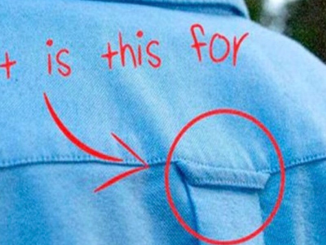
Leave a Reply